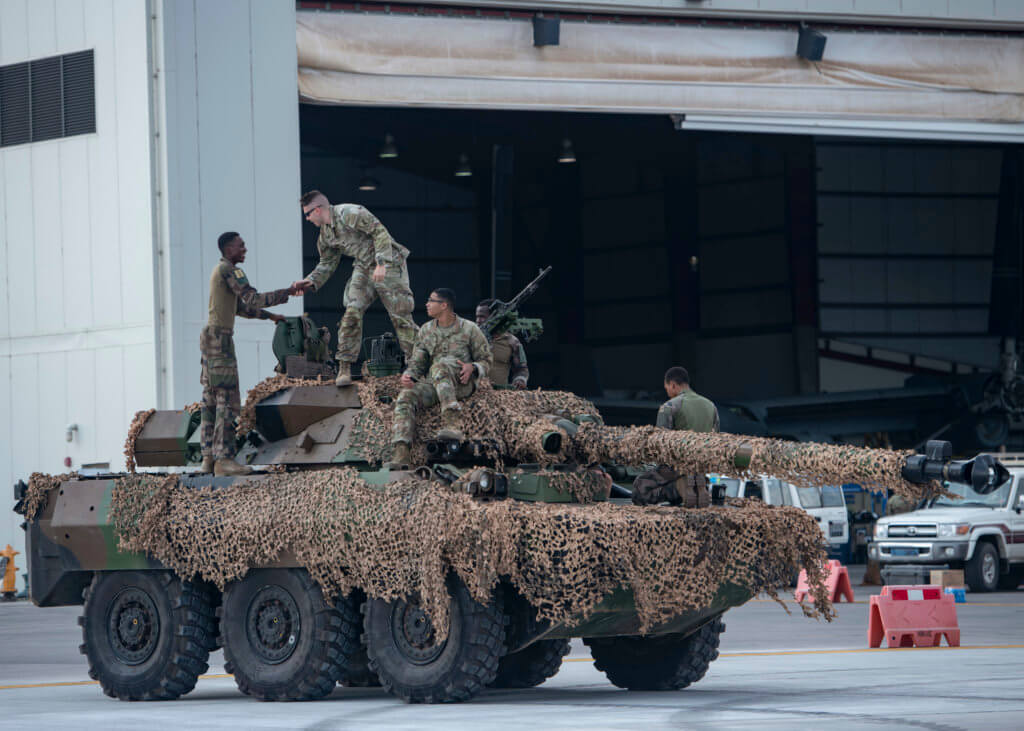Two days after the first Wisconsin brigade to deploy to Africa arrived, Maj. James Schmitz flew to a far-off U.S. embassy for a crisis-management exercise.
It was a busy month for the Wisconsin Army National Guard’s 157th Maneuver Enhancement Brigade, which arrived at Camp Lemonnier in Djibouti in October. Schmitz, a forward coordinating element team leader, serves within the future operations and crisis planning branch.
“We’re always looking at five or six different places that, you know, have political instability and have the potential to become larger crises,” he said. “We are actively planning for those and continually updating our ability to respond across the continent.”
This focus on crisis response is why Schmitz flew out of Djibouti so soon after arriving. In addition, he said his team supports the protection of American interests, which is another line of effort for Combined Joint Task Force-Horn of Africa (CJTF-HOA). CJTF-HOA also strengthens U.S. strategic influence, provides extra security and supports allies — all endeavors the Wisconsin brigade embraced.
RELATED: OPINION: Finding value in the repetition of deployment training
The U.S. started directly collaborating with forces on the continent 20 years ago. One of the brigade’s first duties upon arrival last year was executing a partner appreciation day to celebrate those relationships. The day highlighted the unity among the forces at Camp Lemonnier and included a demonstration of each nations’ abilities.
Capt. Parker Ashworth recognizes the significance of that appreciation day and his deployment. His assignment focuses on operations, activities and investments to support and strengthen the U.S. strategic influence with African partners and allies.
“It’s a unique operating environment and just a wonderful opportunity to learn more about the operations, planning processes and all the activities and work that goes into developing these long-lasting partnerships,” he said.
Spc. Madeleine Parmenter, who is assigned to the 157th MEB, compiles data, including weather reports, the timing of flight departures and arrivals and any major events for a daily briefing to the commanding general and staff at Camp Lemonnier. In the process, she has worked with several branches and units from numerous U.S. states.
She said they took somebody from every MOS “and put us in a giant group and we’re completing this mission.”
Parmenter also participates in USAFRICOM operations and intel briefs weekly. That meeting, and the specialist’s work, create situational awareness among everyone who needs to make decisions based on the shared information about continental events.
“The operations and intel brief really opens your eyes to a lot of events that are going around Africa,” she said. “You learn how all these countries are impacting these smaller developing countries.”
For example, droughts and food shortages are affecting daily life for many on the continent. There can be incidents serious enough that opportunities appear for partnership. As part of CJTF-HOA’s mission, U.S. forces like the 157th MEB join other nations’ leaders and soldiers to promote Africa’s security and stability.
“That’s part of the importance of why we’re here,” Ashworth said. “The more that we’re integrated and unified, the better we can respond to crisis.”
Schmitz said he now understands the unique challenges embassies can face in crises. Part of his team’s mission is a follow-up to the risks revealed during an attack 10 years ago against a U.S. diplomatic compound in Benghazi, Libya.
“How do we respond to whatever crisis may be, whether it’s political instability within a country, whether it’s a humanitarian aid response to a disaster, like a cyclone?” he said. “How do we support our Department of State allies or the Department of State teams in embassies across the continent? How do we support our partners, the other governments of Africa?”
Answering such questions is why the brigade’s deployment is historic, he said. Nearly 300 soldiers from the Wisconsin Army National Guard are deeply involved in the everyday needs and dynamics of the continent.
“We have people who touch every aspect of the CJTF-HOA mission,” he added.
Whether preparing for crises or planning celebrations, Schmitz sees the Wisconsin brigade advancing 20 years of accomplishments of U.S. and partner forces.
“We’re just trying to carry the ball a little bit further,” he said of the 157th MEB’s mission. “It’s just a continuation of those who have come before us. We’re just a small part in the overall history of that specific mission.”

